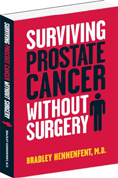|
|
Alternative vs. Conventional Treatment of Prostate Cancer
Conventional
Treatments
Treatment of prostate cancer is
determined by the stage of the cancer. The current accepted medical
treatments for cancer involve directly killing the cells that display
such unregulated growth. In addition to surgery, chemotherapy and
radiation are the only two accepted forms of cytotoxic therapy.
However, three very important questions come to mind when considering
these treatment modalities. 1.) Do they really address the cause
of the cancer? 2.) Do they risk causing too much "collateral damage" to
the patient? 3.) How effective are they at preventing a recurrence of
the disease?
When used judiciously, surgery, chemotherapy and radiation may have
important roles to play in controlling the progression of cancer, but at
best they represent a delaying tactic.
Surgery
Radical Prostatectomy
If the radiation is limited to the prostate, radical
prostatectomy (the
removal of the entire prostate gland and the accompanying
seminal vesicles. In
this surgical procedure the prostate is removed and a catheter
is inserted to drain urine, blood, and tissue out of the
bladder. If a patient is too old or too ill to undergo this
surgery a catheter will be inserted on a permanent basis. The main disadvantage of surgery is
that it requires a lot of recovery time (at least four weeks).
During your recovery, you may have some temporary problems with
incontinence. And if you don't have nerve-sparing surgery,
you'll be permanently impotent. Other risks include urinary
incontinence, significant blood loss that requires a transfusion,
pain from surgery, blood clots in legs, lymphoceles in the pelvis,
infection in the incision or pelvis, nerve damage from lying on the
table in the wrong position, swelling in legs from the removal of
the lymph nodes, injury to the rectum or ureters, and so on.
TURP
(Trans-urethral resection of the prostate)
In the surgical procedure TURP (Trans-urethral resection of the
prostate) the doctor removes a part of the prostate. This
procedure often makes the problem worse and has a high death
rate. TURP may also cause sterility, impotence, and
incontinence.
Cryosurgery
Cryosurgery (which is also
known as cryotherapy or cryoablation) refers to the
procedure in which cancer cells are frozen. Some of the
primary disadvantages include tissues surrounding the prostate being
damaged. If healthy tissue is damaged, significant side
effects such as urethral burning, incontinence, and rectal problems
can occur. Another disadvantage involves the nerve bundles
that control erections often unavoidably get frozen during the
procedure, which can lead to impotence.
Radiation Therapy
Radiation therapy can be performed externally with, with
external beam radiation therapy (EBRT), or internally, with
brachytherapy (a procedure where radioactive seeds are either
permanently or temporarily inserted into the prostate. A major
disadvantage of radiation is that it may cause impotence and urinary
incontinence. The buildup of scar tissue can cause impotence
for a year (or more) after treatment. Radiation can also cause
other problems with the bladder and rectum. Other side effects
include hair loss, weakness and tiredness.
Hormone
Therapy
Hormone therapy involves administering hormones to suppress
natural testoterone (a male hormone). Common side effects
include hot flashes, irritability and mood swings, lowered sex
drive, weight gain and redistribution, loss of muscle mass,
osteoporosis, and depression.
Chemotherapy
Anti-cancer drugs that are give (either orally, intravenously, or by
injection) to attach the cancer cells. The primary
disadvantage of chemotherapy is the side effects, which may be
sever. Side effects can include nausea and vomiting, loss of
appetite, weight loss, hair loss, and extreme fatigue.
Conventional treatment
focuses exclusively on destroying the cancerous cells, but in so doing it fails
to address the underlying anabolic imbalance that set the stage for the
development of the cancerous condition in the first place.
Prevention is far better than attempting a cure, but if you already
have a prostate condition, there is still a great deal you
can do. In addition to lifestyle changes including
diet & exercise,
Nutrition 2000 has developed a Protocol that incorporated vitamins,
minerals, herbs and supplements to manage and help reverse the
cancer cycle. If you are serious about taking an active
approach and would like to learn more, please
submit the
following information and a Consultant will contact you within 24-48
hours.
Recently Diagnosed with
Prostate Cancer? Conventional Treatment no Longer Effective? There is Hope. Many
men in your position are now living full and active lives.
Click Here to read some of
their testaments.

|

Watch, Fight and Pray:
My Personal Strategy to Combat Prostate Cancer
By Lonnell
Johnson, Ph.D
Paperback
This book
provides a powerful message that prayer changes things. Dr. Lonnell
Johnson's personal testimony provides a unique strategy of how faith,
prayer along with our Prostate Cancer Protocol allowed him to defeat prostate
cancer.
Read more about this book

Surviving Prostate Cancer without
Surgery
By Bradley
Hennenfent, M.D.
Paperback
"Surviving Prostate Cancer Without
Surgery" by Bradley Hennenfent, M.D. (Roseville Books, 2005), begins with the
shooting of a urologist and includes a WWII Battle. Men, and the women who love
them, who want to avoid impotence and incontinence while beating prostate
cancer, will adore "Surviving Prostate Cancer Without Surgery", which reads like
a novel and exposes the big lie.
Read more about this book
|
